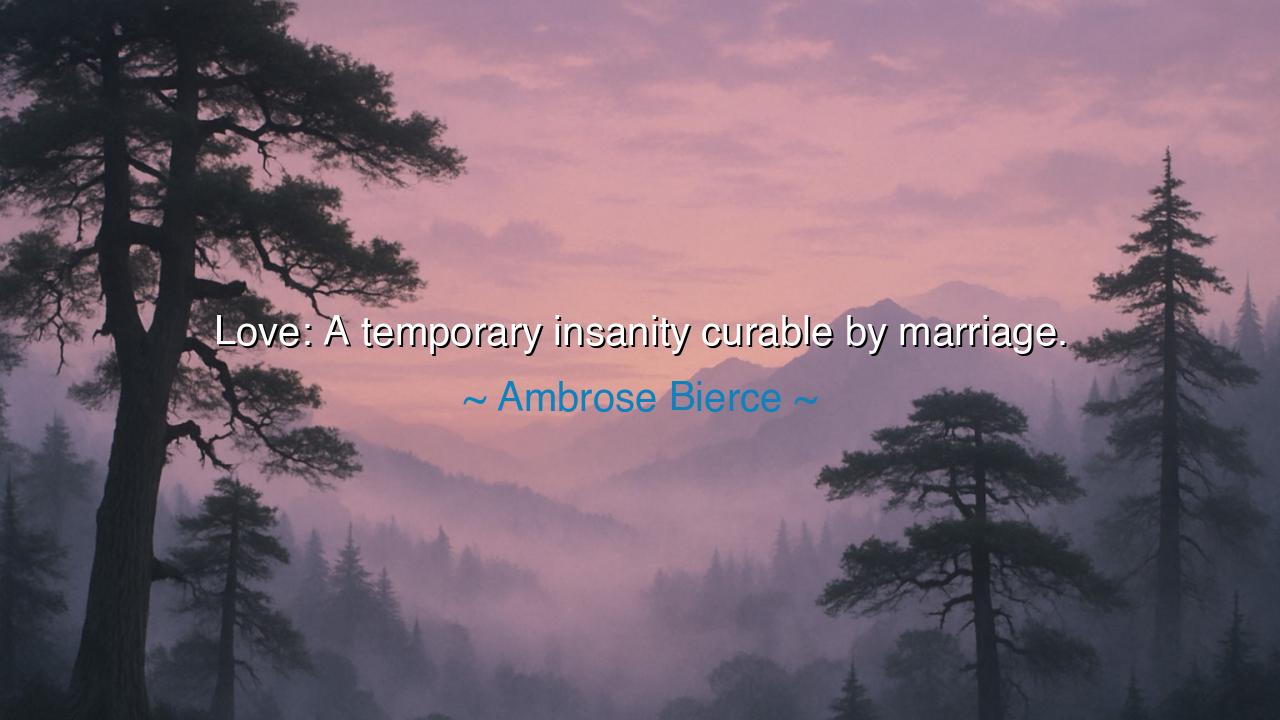
Love: A temporary insanity curable by marriage.






“Love: A temporary insanity curable by marriage.” These words of Ambrose Bierce, drawn from his famous Devil’s Dictionary, appear at first as a jest, a piece of cynical humor meant to provoke laughter. Yet beneath their sting lies a deep and ironic wisdom about human passion and the frailty of the heart. Bierce, a man who lived through war, disillusionment, and loss, was no stranger to the illusions that drive people into love — nor to the sobering truths that follow it. In this brief and biting definition, he captures the eternal contrast between the madness of desire and the sobriety of commitment. His wit is the weapon of one who has seen both — the fever of romance and the calm that comes after it.
To call love a temporary insanity is to speak of the way passion blinds the reason and seizes the soul. In its earliest form, love consumes — it lifts the spirit into heights of ecstasy and plunges it into valleys of despair. The ancients knew this well. The Greeks said that Eros was both divine and dangerous, a god who struck without warning and enslaved even the wise. Plato called love “a kind of divine madness,” for it drives men to do what they would never do in their senses — to sacrifice, to create, to dream beyond all measure. Bierce, echoing this ancient view, adds a modern twist: he calls it not divine, but insane — for in his skeptical eye, love is less a gift from heaven than a spell cast by folly.
Yet Bierce does not stop there. He writes that this insanity is curable by marriage, a phrase dripping with irony but not devoid of truth. Marriage, he implies, is the great sobering of passion — the transformation of fantasy into routine, of ecstasy into endurance. Where love is feverish and impulsive, marriage demands patience and discipline. It strips away illusion and replaces it with the slow, steady labor of companionship. To the romantic dreamer, this may sound bleak, but to the wise, it is simply the natural progression of affection from flame to hearth, from storm to shelter. Bierce’s humor hides a paradox: that only through the “cure” of marriage does love learn to live beyond its madness.
Consider the story of Napoleon Bonaparte and Joséphine, one of history’s great romances. When Napoleon was young, his love for Joséphine bordered on delirium — he wrote her letters filled with longing, jealousy, and obsession. Yet once they married, the realities of power, ambition, and distance eroded the fantasy. The fever of passion cooled into indifference, and eventually he cast her aside. In this tale, we see Bierce’s “cure” at work: the wild insanity of love subdued by the weight of everyday life. And though the outcome was tragic, it reveals a timeless pattern — that passion, left unchecked, cannot survive the discipline that life and duty demand.
Still, we must not mistake Bierce’s cynicism for hatred of love. His irony is that of a disappointed romantic — one who has seen love’s splendor, but also its shadows. He mocks love’s madness not to destroy it, but to warn against its illusions. His laughter, sharp as a blade, reminds us that real love cannot live forever as fire; it must learn to endure as warmth. The ancients, too, understood this. The Roman poet Ovid wrote that “Love is a warfare,” and that only those who temper passion with reason can survive it. Bierce, centuries later, agrees in his own dark way: that love’s greatest trial is not its birth, but its survival after the fever breaks.
In this sense, Bierce’s quote is not merely satire — it is prophecy. Marriage, whether literal or symbolic, represents the union of emotion and reality, of dream and duty. It is the crucible in which love is tested. Many flee from it, believing that the end of passion is the end of love, but those who stay learn a deeper truth: that the death of illusion is the birth of intimacy. The madness of love fades, but in its place comes something calmer, wiser, and more enduring — a love that no longer burns uncontrollably, but illuminates steadily.
So let this be the lesson passed down: do not despise the madness of love, for it awakens the soul, but do not mistake it for permanence. When passion rages, cherish it; when it cools, do not mourn it — for in that cooling lies the beginning of wisdom. Marriage, whether between two hearts or between spirit and truth, is not the death of love, but its transformation. Bierce’s humor, though sharp, conceals this eternal law: that what begins in madness must end in understanding, and what begins in fire must learn to live as light.






AAdministratorAdministrator
Welcome, honored guests. Please leave a comment, we will respond soon